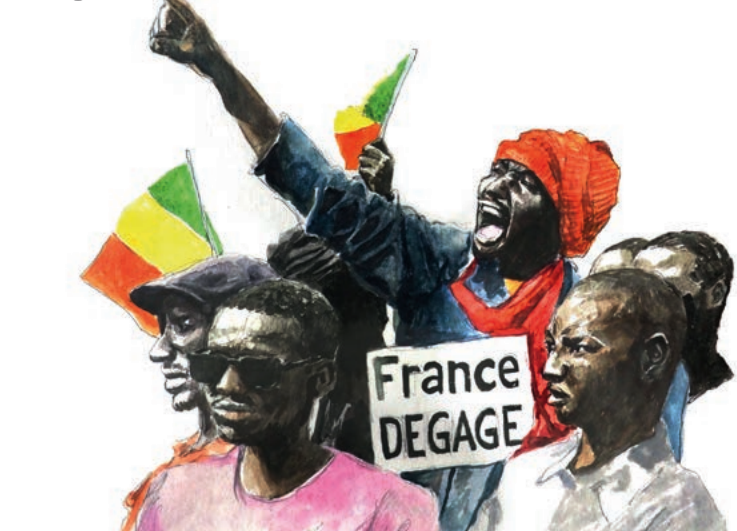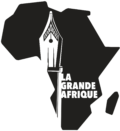
“What is the rejection of France in Africa all about?”, a recent report explores the causes, deconstructing the concept of anti-French sentiment (published in French under the original name : “De quoi le rejet de la France en Afrique est-il le nom ?”). Illustration of the report by Axel Champloy, 2024.
“I think people have forgotten to say thank you to us,” said Emmanuel Macron on January 6 at the annual ambassadors’ conference, referring to Operation Barkhane (2014-2022). The French president continues to believe that France “was right” to intervene militarily in the Sahel against terrorism, and criticized the “ingratitude” and lack of “courage” of certain “African governments”.
Although they were aimed at Sahelian leaders who came to power after recent military putsches, the virulence of these remarks created controversy in other French-speaking African countries. “I think he’s in the wrong era”, declared Chadian President Mahamat Idriss Déby Itno, after his government denounced a ‘contemptuous attitude’. Senegalese Prime Minister Ousmane Sonko, for his part, recalled that France “has often contributed to destabilizing certain African countries such as Libya, with disastrous consequences for stability and security in the Sahel.” Chad and Senegal have reaffirmed their sovereignty in their decision, on November 28, to act on the departure of French military personnel present in bases on their soil.
These reactions testify to a gap between, on the one hand, supposed anti-French sentiment – an expression increasingly used in France in recent years – and, on the other, elements of “contestation of French policy in Africa”, as rectified by journalist Ousmane Ndiaye and other intellectuals.
The analysis was recently taken further in a research report entitled “De quoi le rejet de la France en Afrique est-il le nom?”, published by the citizen’s movement Tournons la page (TLP) and Sciences Po’s Centre de recherches internationales (CERI). Among the participants, activists and trade unionists from Côte d’Ivoire, Benin, Chad, Cameroon, Niger and Gabon, the expression was “unanimously” rejected: “We don’t have an anti-French problem. [The problem] is French policy here”, corrected one of them.
On the French side, people’s experiences are countered by the idea of a misunderstood or misunderstood policy, which is reminiscent of the situation in Mayotte after Cyclone Chido. However, the use of the term “anti-French sentiment” by political leaders is recurrent whenever an action carried out by France is contested on the continent: “The use of the term ‘sentiment’, referring to affect in politics, tends to make criticism of France irrational”. The report addresses, one after the other, the various aspects of this criticism since the political independence of the 1960s.
The presence of the French military was seen as having failed to improve the security situation. While the rapprochement of certain countries with Russia is a matter of debate, it emerged from the discussions that “Russian propaganda feeds on the errors of France’s African policy, but it is not the cause of them”.
On the economic front, it’s hard to forget the close links between certain French companies and corrupt regimes. This is what can make several of them symbols of French interests in Africa, such as Auchan stores, which have been looted on several occasions in Senegal. From a diplomatic point of view, the French government is criticized for its double standards. Emmanuel Macron is criticized for having recognized the re-election of Alassane Ouattara in Côte d’Ivoire for a third term and the seizure of power by Mahamat Idriss Déby in Chad after the death of his father, while condemning coups d’état in the Sahel. The use of democracy as a façade is pointed out as one of the factors behind the popular hope generated by coups d’état.
The report reflects a shared sense of unfinished sovereignty, particularly economically: its conclusions are not new, and suggest an accumulation effect, stemming from a certain colonial continuity. In 2022, Tournons la page recommended, among other things, that “France should abandon its posture of having an African ‘vocation’, a condition for the country’s ‘greatness’ on the international stage.”
With the aim of constituting a “prerequisite for rebuilding a relationship based on mutual respect”, the research team acknowledges its own biases (“a predominantly French, male editorial team imposing the pace and objectives from Paris”). All the historical and contemporary elements explored in the debates – not all of which could be mentioned – give an idea of how far we still have to go, both in terms of awareness and deeds, not to mention words.
